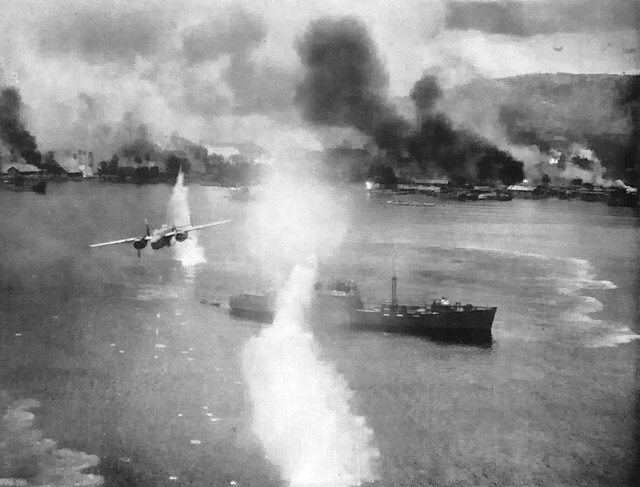November 2 in U.S. military history
1783: Gen. George Washington delivers his “Farewell Address to the Army” near Princeton, N.J., in which he refers to the Continental Army as “one patriotic band of brothers.”
1861: Pres. Abraham Lincoln removes Union Gen. John C. Fremont as commander of the Western Department, following Fremont’s unilateral decision to declare martial law in the border state of Missouri and thus freeing all slaves.
1943: One day after the 3rd Marine Division lands at Bougainville, the cruisers and destroyers of Admiral Aaron S. “Tip” Merrill’s Task Force 39 defeat Japanese naval forces attempting to attack the landing force in the Battle of Empress Bay. Two Japanese ships are sent to the bottom, with numerous enemy warships receiving heavy damage.
(Featured image) Meanwhile, in the skies over the nearby Japanese fortress of Rabaul, Maj. Raymond H. Wilkins, Commander of the Army Air Corps’ 8th Bombing Squadron, led an attack against Japanese-held Rabaul. His bombs destroyed an enemy transport and destroyer, and although his plane was badly damaged and his bombs expended, Wilkins strafed a Japanese cruiser, sacrificing himself by drawing their fire so his fellow pilots could escape the deadly air defenses. The raid sinks 30 of the 38 Japanese vessels anchored at Rabaul, and Wilkins will posthumously be awarded the Medal of Honor.
1944: Nearly 1,000 8th Air Force bombers conduct a massive strike against synthetic fuel facilities in Merseburg, Germany. The Americans shoot down 183 enemy fighters – including four jets – at the cost of 40 bombers and 28 fighters. By wars’ end, the 8th Air Force has severely crippled the synthetic fuel production necessary for Luftwaffe jets.
1950: During a fanatical nighttime assault by enemy forces near Sudong, North Korea, Staff Sgt. Archie Van Winkle leads his outnumbered Marines through heavy fire and enables them to gain the upper hand. Despite a bullet rendering his arm useless and further wounds from an enemy grenade, Van Winkle rushes through hostile fire to rally his men, refusing evacuation and providing leadership until Van Winkle loses consciousness. The combat veteran of World War II will be awarded the Medal of Honor for his actions at Sudong, and will be decorated for valor 18 years later during the Battle of Khe Sanh in the Vietnam War.
1963: Unpopular South Vietnamese President Ngo Dinh Diem is assassinated following a U.S.-backed coup by the South Vietnamese army.
1967: Seeking to unite the country behind the war effort in Vietnam, Pres. Lyndon B. Johnson holds a secret meeting with a group of advisors referred to as “the Wise Men.” The group, which includes General of the Army Omar Bradley, former Secretary of State Dean Acheson, and former Ambassador to South Vietnam Henry Cabot Lodge, determines that the military should issue more optimistic reports to influence more favorable press.

Today’s post is in honor of Sgt. 1st Class Johnny C. Walls, who died of wounds sustained from small-arms fire in Uruzgan, Afghanistan on this date in 2007. Walls, 41, of Bremerton, Wash., was assigned to 1st Brigade, 1st Infantry Division and had previously deployed to Iraq in 2003.
